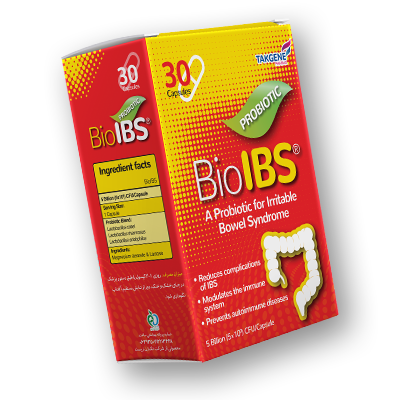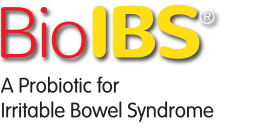

Probiotics are products with live microorganisms with specific count that modulate body microflora pattern and have diverse mechanisms to affect health and wellbeing of the host. Probiotics are used to treat different digestive problems including colitis caused by clostridium defficle and antibiotic induced diarrhea. Recently role of probiotics in prevention and improving the symptoms of multifactorial diseases like IBS and MS has been brought up. These products can be very helpful in IBS, for improving Peristalsis problems, bacterial overgrow in intestines, macroscopic inflammations and Visceral hypersensitivity.
BioIBS
Active substance: Lactobacillus casei, Lactobacillus rhamnosus, Lactobacillus acidophilus
Other ingredients: Magnesium stearate, Lactose
Dosage: 5×109 CFU/Capsule
Why use
• Decrease side effects of IBS
• Decrease visceral hypersensitivity
• Improving gas, bloat and abdominal pain
• Regulating immune system, decrease chronic and mild inflammation in patients with IBS
• Prevent auto immune disease
Recommended use
Take 1-2 capsules daily before meal with your meal or as prescribed
Mechanisms of action
• Increase useful bacteria total count in digestive system
• Balance between pre inflammatory cytokines and anti-inflammatory ones (IL-10 and TGF BETA)
• Decrease inflammatory cytokins TNF-α and TNF-y
• Improve intestinal pain by inducing μ-opioid receptors and cannabinoid expression in intestine epithelial cells
• Adhesion to intestine cells and inhibit pathogen adhesion that prohibit pathogen transmission inside body
• Improve defense barrier in intestine epithelium
• Acid lactic production and decrease intestine pH
• Produce antimicrobial factors like bacteriocin and defensin
• Produce butyric acid that is the main energy source for enterocytes
• Decrease population of methane producer bacteria that leads to better peristalsis and less gas and bloat
• Improve and maintain intestine mucus layers
• Increase intestine mucus thickness and improve epithelial cells health
• Improve tight junctions between epithelial cells and decrease intestine permeability that inhibit toxin, lipopolysaccharide and gram negative bacteria transmission to systemic blood stream, improve chronic and mild inflammations in IBS patients
• Inhibit epithelial cells apoptosis
• Improve intestine dysmotility and gas handling
• Regulating signal transduction pathways like NF-KB pathway that improve innate and adaptive immunity
• IgA secretion in intestine mucus that increase mucosal immunity level
Side effects
In some cases, using this product may lead to bloat and gas in gastro intestinal tract at the beginning but it will disappear after a while. Consult with your physician if any other side effects are observed.
Precautions
There is no contraindication for this product.in case of cardiac problems, endocarditis and immune deficiency consult your doctor before use .in case of abdominal surgery, short bowel syndrome surgery or organ transplant using probiotic should be under doctor supervision.
Using in special groups
Consult your doctor before taking this product during pregnancy or breastfeeding.
Drug interaction
Use with caution with immunosuppressive drugs.
Storage
Keep for 2 years in cool and dry places with temperature of 25 °C
Clinical trials of using probiotic in IBS patients
IBS is characterized by mild inflammation of the lining of intestine wall that induces changes in l function or structure of mucus.
Probiotics can be useful in improving this disease by affecting immune System, intestine movements and intestine tract lumen. Probiotics decrease mild and chronic inflammation in IBS and maintain innate immunity. Lactobacillus are capable of deconjugating bile acids that help in defecation in IBS-C patients. In addition, probiotics increase ion and water reabsorption and decrease intestine liquids that decrease chance of diarrhea in IBS-D patients. Researches have shown that intestine movements are slower in IBS-D patients that were treated by probiotics that decrease their digestive problems (Camilleri et al).
In a study that was carried out by Pedersen et al, the results have shown that lactobacillus rhamnosus is a suitable probiotic in treating digestive problems due to its good adhesion ability to intestine wall and resistance to bile salts and gastric acid. Administrating lactobacillus rhamnosus for 6 weeks was very effective in treatment of IBS especially in subtype D (diarrheal) and M (Mixed). It was proven that using lactobacillus rhamnosus for one month can decrease abdominal pain, and digestive problems in IBS patients (Sinn DH et al). In a study that was done by Rousseaux et al it was concluded that prescribing lactobacillus acidophilus increases cannabinoid and mu-opioid receptors expression in intestine epithelial cells that have analgesic function in intestine (like morphine) and decrease abdominal pain caused by visceral hypersensitivity in IBS patients. In addition, clinical studies that were done by Kim H et al have proven that lactobacillus casei decrease bloat and reduces inflammation by lowering TNF-α expression in intestinal folds. In a research that was done by Preston et al, it was shown that administrating lactobacillus casei, rhamnosus and acidophilus in patients with different IBS types reduced bloat and abdominal swelling, and improved stool consistency especially in women with IBS-D.

